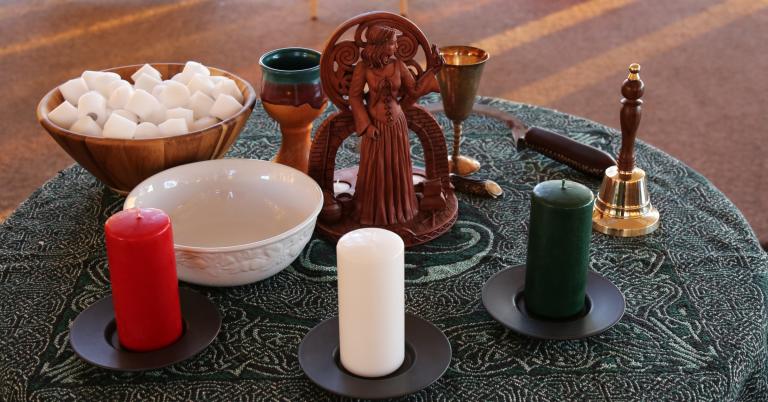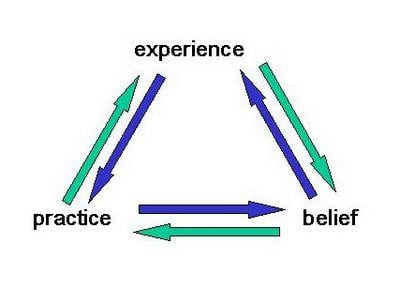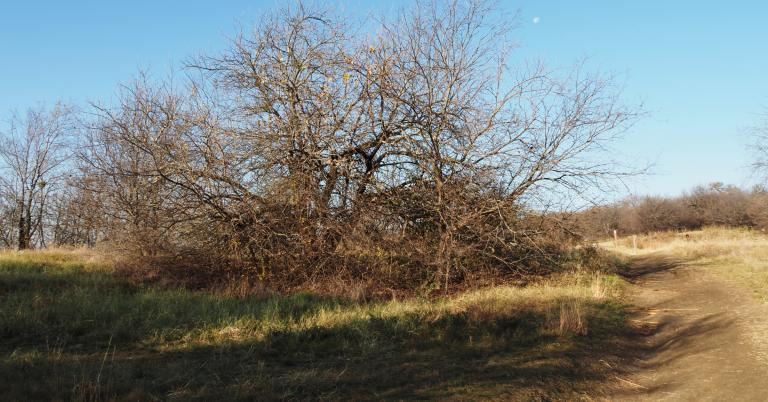My Paganism begins with experience. It is a religion of relationships, and it is orthopraxic not orthodoxic – it’s more important to do the right things than to believe the right things.
But that doesn’t mean belief is unimportant. There’s a place for belief in Paganism, even if it isn’t at the center of our religion(s). In this post, I want to look at the matter of belief: what it is, how it arises, and how we can develop beliefs that are meaningful and helpful without falling into false and harmful certainty.
What is belief?
Merriam-Webster lists three definitions of the word “belief.” All three are intertwined and all three are good, but it’s the third that’s most relevant here: “conviction of the truth of some statement or the reality of some being or phenomenon especially when based on examination of evidence.”
Too many people think that belief means accepting something uncritically and without evidence, that it’s mindlessly repeating what you’re told instead of thinking for yourself. There are other, better words for that: “indoctrination” “mind control” “unresolved trauma” and all too often “intellectual laziness.”
Done right, belief is an interpretation of our experiences and the experiences of others. All we know with certainty is that we saw, heard, and/or felt something that defied conventional explanation. We use the process of discernment to try to figure out what happened, and more importantly, what it means for us in our lives. That interpretation becomes a belief.
Over time, beliefs that are robust are affirmed by other experiences, whether our own or those of others. They grow stronger and deeper as we become convinced that they really are meaningful and helpful, even if we can never be sure they’re true.
Foundational assumptions provide context for beliefs
We can only believe what we think is possible. And what we think is possible is controlled by our foundational assumptions: our basic, gut-level ideas about the world and the way it works.
I think that some of our foundational assumptions are an orientation we’re born with. But many come from what we were taught as very small children: from what we picked up by observation as much as anything we learned in kindergarten or Sunday School.
If you’re convinced that nothing exists except matter and the product of its interactions, you will find it difficult if not impossible to believe in the reality of spirits. If you are convinced there is only one God and that polytheism is a “primitive” superstition, it will be very difficult for you to relate to one of the Many Gods.
If you’re convinced people who aren’t like you are always trying to “take what’s yours” it will be very difficult for you to practice good hospitality.
Most people aren’t even aware that they have foundation assumptions. They think that’s just the way things are – it’s “common sense” or “what everybody knows.”
Identifying and challenging your unstated assumptions is very, very hard. It’s also very important, because our foundational assumptions control what we can believe.
The order of belief
I’ve shown this diagram multiple times over the years – a version of it is in The Path of Paganism. Practice, experience, and belief form a “virtuous circle.” One leads to the others, and over time it leads to an ever-deepening cycle of meaning. When I first drew this diagram I said you can enter at any point and travel in any direction. In general this is true.
But in an orthopraxic religion we begin with practice. When we do the practices (properly and consistently) we have experiences. When we interpret our experiences, we form beliefs. And those beliefs inspire us to keep practicing, which continues and deepens the virtuous circle.
An orthopraxic religion never asks its followers to believe mindlessly. Rather, it says to do these things because they’ve proven helpful. The practices lead to experiences (which, to be clear, are often ordinary and not otherworldly), and the experiences lead to beliefs.
Belief comes third.
Common practices lead to common beliefs
You can have your own individual beliefs and practices, but religion is what we do together. It’s how we form sacred relationships with our Gods and ancestors, with the natural world, and with each other.
We practice together. We observe the same cycles of the moon, we sing the same songs, we pour similar offerings to the same deities. These common practices naturally lead to shared experiences. And especially if they’re grounded in a common culture and common foundational assumptions, we’re likely to interpret them in very similar ways. Common practice leads to common beliefs.
Over time, this runs the risk of turning into orthodoxy – of shifting from “these are our most consistently helpful interpretations” to “this is the only valid interpretation.” But if we keep our primary emphasis on action rather than on interpretation, we can remain open to unorthodox interpretations that may be helpful for an individual, or for many individuals.
And more importantly, we can avoid becoming stagnated in beliefs that may have been helpful at one point but that are now outdated and harmful.
Beliefs are necessary to explore the world of spirit
So why even bother with belief? Why not just practice, experience, and leave it at that?
I don’t know about you, but I can’t just leave it at that. If I have a spiritual experience – from the very ordinary to the deeply mystical – I can’t help but wonder what it means. In part, I wonder what it means for me. But I also wonder what it tells us about the nature of the universe.
I experience the presence of another person who I cannot see or touch. I interpret that as the experience of a God. What does it mean that there are Gods? What does it mean that this God is called the Morrigan? What does it mean that She wants me to prepare for a time of upheaval? What is changing? What is changing that I cannot see? What does that tell us about the nature of the Otherworld?
All these questions demand answers. Maybe you can decline to answer them – I can’t. And every answer leads to yet more questions.
Taken in total, these questions and their tentative answers form a model of the worlds (two? nine? many?) and how they work. They tell a story that provides context and meaning. They help us orient ourselves in the big picture.
Good beliefs don’t shut down curiosity – they encourage it.
Good beliefs require humility
Whatever we learn through this process of exploration, it’s important to remember that our conclusions are beliefs, not facts.
Science doesn’t have all the answers, but the answers it has are generally reliable, and we ignore them at our peril. We make further mistakes when we assume science tells us something it doesn’t – bad science makes for bad religion.
Multiple experiences over time lead to confidence in our interpretations, especially when they align with the experiences and interpretations of others, and with the stories from our pre-Christian ancestors. This is a good thing. When I say I know there are many Gods and some of Them want certain things from me, I am expressing a confidence that comes from years of consistent practice and experience and from interpretations that have been affirmed over and over again.
And I still recognize that our understanding of the Gods is like cats’ understanding of humans.
Whatever confidence we may have in our beliefs, whether individually or collectively, ultimately they are our best guesses.
They might be wrong.
While we explore our beliefs as deeply as we can, we must hold them loosely. If we discover or are presented with evidence that our beliefs are wrong, or that a different belief is more meaningful, more helpful, or more accurate, then we must have the integrity to change our beliefs.
Practice remains primary
When your religion is centered on beliefs, what do you do when those beliefs are shown to be untrue?
Christian fundamentalists deny the reality of evolution, the age of the Earth, the equality of women, and the dignity of LGBTQ persons because their religion is centered on the belief that the Bible is the literal and inerrant “Word of God.”
When you build your religion on belief you build a house of cards. Without a historical Adam and Eve, the whole doctrine of original sin falls apart. And so fundamentalists reject reality rather than change their beliefs.
Meanwhile, in one of our CUUPS Imbolc rituals everyone made offerings to Brighid. Some offered to the Goddess, some to an aspect of the Divine Feminine, some to the saint, and some to the ideals of poetry and smithcraft. What we believed about Brighid was less important than the fact that we all made offerings to Brighid.

Practice leads to experience. Experience leads to belief. Belief motivates us to practice more deeply. There is a place for belief in a religion centered on practice and on right action.
It’s just not at the center.




















